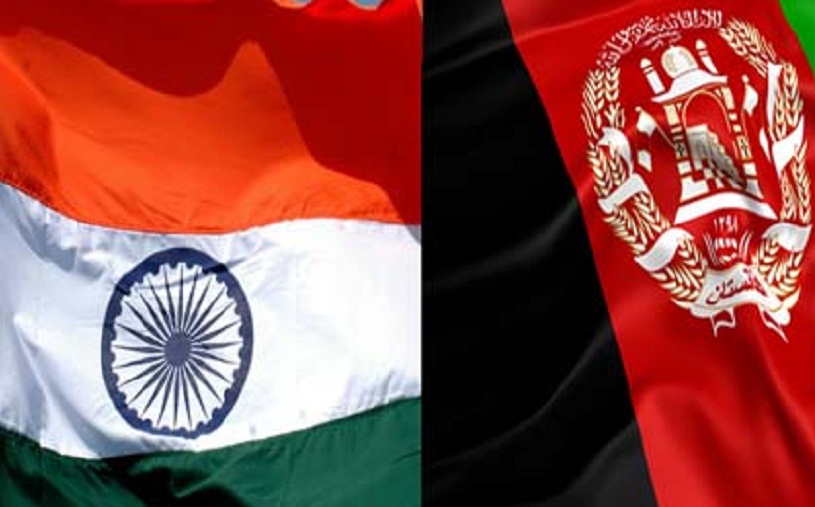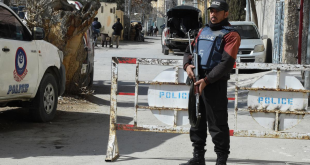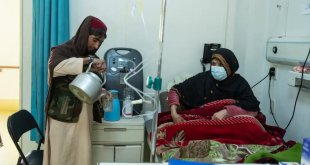Former President Hamid Karzai meets the small, forgotten Afghan ‘Sheen Khalai’ community in India on whom a film is being made
As they walk through the corridors of the exhibition, looking at photographs of themselves in traditional clothes, the women begin to sing first. At first, the tune is tentative. Then, as more and more join in, it becomes a roaring chorus, and they clap to words of the song, ‘Sheen Khalai’, and dance the ‘Attan’ folk dance in the way they were taught seven decades ago. ‘Sheen Khalai’ (blue skin) is not just a name for these women and men, many of them well over 90 years old, it is the story of their identity, one that brings forth tears even today. They fled with their families from the tribal areas between Afghanistan and Pakistan during the Partition in 1947.
The women are part of a community of Pushtun Hindus that lived in the Baloch areas of Quetta, Loralai, Bori and Maikhter, and belong to the Kakari tribes still living there. 1947 was a second partition for their villages, as the British-imposed Durand Line in 1893 had already given their villages to Pakistan, despite the people’s Pushtun lineage.
In 1947, they were forced out of their homes overnight. “The government told us to leave quickly and go to India. We didn’t even look back at our homes, just ran,” says Lakshmi Devi, who can’t remember her age now, but says she was a teenager then. Like many other Hindu families from Sindh and Balochistan, Lakshmi Devi, her father and siblings were sent to resettle in the village of Unniara in Rajasthan, about 130 km south of Jaipur. But once they reached, they realised that while being Hindu brought them shelter, it didn’t bring them acceptance, given their ‘Sheen Khalai’.
“It was their blue skin, the colour of the face tattoos that women in tribal areas have, that set them apart from their neighbours, and even from the Hindu women of Pakistan,” explains Shilpi Batra Advani, a documentary filmmaker from a Pushtun Hindu family. Ms. Advani is completing a film on the Sheen Khalai. “My own grandmother started to cover her face, and was shy around outsiders, because she feared being shunned for the tribal tattoos that were looked down upon,” she adds.
Some had trouble renting a home, others were viewed with suspicion by neighbours. “We tried to scrub and scrub, but the tattoos wouldn’t fade away,” says 103- year old Pyari Devi in Ms. Advani’s film. As a result, most found it easier to assimilate as Pakistani-Hindu women not as Pushtuns, dressed in saris and salwar suits, and spoke the local language publicly while teaching their children Pashto.
Mining memories
In her quest for information about their past, Shilpi Advani, with her mother Yashoda’s help, began work on the film about the roughly 500-600 Hindu Pushtun community members in India. She interviewed elders for their memories, and coaxed women into pulling out old traditional tribal clothes from the bottom of their suitcases, like the ‘kakari kameez’ they would have worn in their villages. Most were frayed at the edges, but still rich with embroidery, mirror work and colourful tassels, which Ms. Advani restored.
During the course of her research, Ms. Advani spent a year and a half in Kabul and spoke to journalists about her family’s villages in Balochistan across the line. One day, she received a video over a social media site: it was an interview with an old villager in Balochistan’s Maikhter who remembered his neighbour Prakash and his two daughters had left for India one hurried night. The name rang a bell and Ms. Advani traced back the family in Rajasthan for her film. The audience watching the interviews claps with joy at a glimpse of the village.
But the biggest joy comes from a special visitor who inaugurates the exhibition and speaks to them: former Afghanistan President Hamid Karzai. Ms. Advani reached out to him in Kabul five years ago. “Hearing women singing these old songs is a very special experience. This was them asserting their identity, asserting that no force, or separation or partition can destroy this,” Mr. Karzai told The Hindu .
The Pushtun leader, who was himself once an exile during the 1980s in Shimla, tells his listeners that he met Sikhs from the Frontier area of Mardaan. Among them was his mentor Ajaib Singh, who was equally fierce about his heritage, he says. When asked about the status of minorities in Afghanistan today, after they were attacked and driven out by the Taliban regime in the 1990s, Mr. Karzai says the Taliban was under “Pakistani influence” and doesn’t represent Afghan sentiments.
“The Afghan people want them back. Even just after I took over as President [in 2002], one of my oldest teachers told me our Hindus and Sikhs have suffered more than the Muslims of Afghanistan. He wanted me to bring them back. We had an Ambassador to Canada, and my economic advisor, from the minorities,” he says.
Ms. Advani says her project is for the official recognition of her community. “This is about validation, about giving us a name after all these years of hiding our identity,” she explains.
One by one, the women and men of the Pushtun Hindu community step up to tell their stories, of how they preserved their heritage despite all the odds. “We have changed our clothes ( pahnava ),” nonagenarian Shanti Devi says in fluent Pashto. “But our hearts and tongues remain Pushtun.”
“We have always wondered what we are, since no one owned us,” says Leelaram, who is in his late eighties. “Are we Afghan, or Pakistani or Indian or Hindu or Pushtun?” he asks, and then to answer his own question, he adds, “Today, we have become Pushtuns again.” They all cheer and break into another song, a happy wedding song about ‘beautiful Laila’ that they learnt when they were very young.
Here, just for this moment in the aptly named Frontier Colony in Jaipur, borders have blended, the subcontinent is not so divided and history is not so unkind to this tiny community of ‘Sheen Khalai’, as they sing these words: Tora shpa da tora khun, sheenkhalai na da Maloom/ Tora Shpa ba khudai runya ki, sheenkhalai ba khudai paida ki (It’s a dark night and in a dark room,/ Your Sheen Khalai has disappeared./ But the dawn will break and light will start to enter the room./ Sheen Khalai will start to glow again.)
 Afghanistan Times
Afghanistan Times




